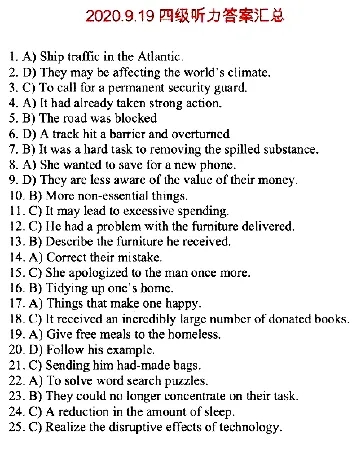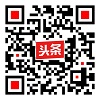政策快讯
学习资讯
2020年9月大学英语四级听力部分答案解析汇总
2020-09-19 12:46
来源:
作者:
2020年9月大学英语四级听力部分答案解析汇总
Section A
News Report 1
A NASA satellite orbiting over Portugal took photographs that reveal the effects of pollution from ships. One of the photos shows a thin film of clouds above the brilliant blue of the North Atlantic, cut by white lines of thicker clouds that look like scars.
NASA officials explained those thicker clouds are signs of ship traffic below. 【Q1】When ships power their ways through the ocean, they pump exhaust into the atmosphere, just as cars do. And those massive amounts of particles can cause clouds to form.
Get enough of those particles in one place, as from the exhaust of a ship, and they can lead to the creation of new clouds easily visible from space. “These clouds can be huge, some of them stretch hundreds of kilometers from end to end”, NSAS officials said.
【Q2】It’s likely that these sorts of clouds are having some effect on the global climate, according to NASA officials. But scientists aren’t yet sure what effect it has.
Q1: What has caused the thick clouds in the photos taken by a NASA satellite?
Q2: What do NASA officials think about the thick clouds?
Section A
New Report 2
Staff at a suburban supermarket in Melbourne say they feel unsafe at work after security guards were removed. This came after a series of physical attacks and verbal abuse by customers. More than 50 workers at the store have signed a letter calling for a permanent security guard following a series of incidents, including a customer threatening to attack a supervisor with a knife. "A security worker had guarded the store each night from 7pm until 12am, but that had stopped suddenly on Monday,” employees said. One worker said an angry customer had thrown a chicken at his head after complaining about how long she had waited to be served. Another worker said the lack of protection at the store made her feel uncomfortable at work. However, the spokesman of the supermarket said the store had taken strong action in response to incidents, "We have found very few instances of bad customer behavior at our store in the past year. In the rare cases we have seen bad behavior, we have taken strong action in response, including banning a customer from the store."
Q3: For what purpose, did the staff at the supermarket in Melbourne sign a letter?
Q4: What did the spokesman of the supermarket say, regarding the employees' demand?
Section B
Conversation 1
Man: Lisa, why did you pay for you meal with cash instead of the payment apps on your phone?
Woman: Well, I’ve gone back to cash. I’m only using payment apps if that’s the only option. 【Q8】I’m trying to save money for a new phone, and I find that using cash rather than payment apps helps me to save.
Man: But how? Money is money, isn’t it? 【Q11】I don’t think it matters whether you take it out to the bank and put it into wallet, or simply transfer from your bank account to the sellers’ bank account using an app.
Woman: No, I believe it does matter. It’s a psychological phenomenon. 【Q9】I believe we have less connection with a value of our money, when we just tap the approve buttons on our phones.
Man: You might have a point, since I stop carrying cash around, and start to using my phone apps to pay, I may have developed a tendency to buy 【Q10】more small or non-essential items.
Woman: That’s highly possible, think about the amount of time we spend with our phones in our hands, and all the things we do with our phones. It sometimes seems that our phone is buying the product for us, not ourselves.
Man: So, cash is the payment affects our ability to budget?
Woman: I believe so. If we spend a hundred Yuan in cash, we realize that we don’t have that hundred Yuan to spend on something else. But if we spend in electronically, we’re less likely to make that mental calculation.
Man: I stopped using my credit card because I’m fond of spending excessively. Perhaps I should take the same approach of paying using my phone.
Woman: It’s worth considering.
Q8: Why did the woman decide to go back to cash for payment?
Q9: what happens when people use apps for payment according to the woman?
Q10: what might the man tend to buy with payment apps?
Q11: what does the man think of electronic payment?
Section B
Conversation 2 售后服务退换货
W: Hello Mr. Brown. I was expecting your call. My secretary told me you were having some problems with the wooden table, is that right?
M: No, no, the table is fine. 【Q12】The problem is the chairs.
W: Oh, the chairs, so, what exactly is the issue?
M: Well, put simply, 【Q12】these are not the chairs my wife and I selected in your store last week. There must be some confusion with our order.
W: Oh, I see. I’m looking through my files now. And I see that the delivery was this morning. Is that correct?
M: Yes.
W: 【Q13】Do you mind describing the chairs that were delivered to your apartment, Mr. Brown?
M: Sure. These have a flat back with a round top and are very heavy. They are light brown and look kind of cheap. The ones we ordered were dark brown to match the table.
W: Right. Of course. It says here you purchased the Arlington table and four Milano chairs. As you said. There must be some confusion with the order. I’m terribly sorry.【Q14】We’ll send a van to collect those four and replace them with the Milano you purchased. Will tomorrow 9 a.m. be OK Mr. Brown?
M: Yes. That would be great. Thank you.
W: Good. Did everything else you ordered from us arrive OK?
M: Yes. I think so. Let me check. The mirror and two paintings are here. The two coffee tables are also here. And the sofa. Yes. We haven’t noticed anything else wrong or missing. But if we do, we’ll certainly let you know.
W: OK. Great. Once again. 【Q15】I’m sorry for the confusion and trouble caused.
Q12: Why did the man call the woman?
Q13: What did the woman ask the man to do?
Q14: What did the woman promise to do for the man?
Q15: What did the woman do at the end of the conversation? – The woman apologized again.
Section B
Passage 1
Do you have too much stuff? Are you dare we say it “untidy”? Say hello to a TV show called “Tidying Up with Marie Kondo”. A home improvement show based on her widely popular book The Life Changing Magic of Tidying Up. In the show, Marie Kondo acts as a tiny garbage fairy for messy people, visiting their houses to share the wisdom of the "KonMari" method. This method is simple in theory but can be endlessly complex in practice. You divide all the stuff in your house – all of it – into several categories, and then examine each item -- all of them – to see if it sparks joy. If it does, you keep it. If it doesn't, you thank it, and neatly discard it.
So, is the TV show inspiring people to tidy up? Firsthand accounts seem to indicate a small wave of people bringing piles of donation bags to used good stores. One store received thousands of bags of used possessions in one day. January is usually the store’s slow season for donations, because it's cold and people don't want to bother. But not this January. People seemed determined to clean up their homes. One used bookstore received a month's worth of books in donations in a week when a man gave over 50 boxes of books from his home. It seems Marie’s TV show is having a big impact after all.
Q16. What is Maire Kondo’s TV show about?
Q17. What things can be kept in one’s home, according to Maire Kondo?
Q18. What do we learn about one used bookstore this January?
Section C
Passage 3
In a recent study carried out by psychologists on the disruptive effects of smart phones, two groups of college students were given word-search puzzles. The first group was told to complete the puzzles with its participants' smart phones in their line of sight. The second group, however, was told that the phones would interfere with the equipment in the experiment and would need be moved away from the testing area. Midway through the second group's solving of the puzzles, the experiment called one of the phones and let it ring for a while before hanging up. Many of the students in that group were unable to focus from then on, becoming anxious and performing more poorly than the first group.
Use of electronics has also been known to lead to a decline in human interactions. Rather than having real-life conversations, many express emotions and engage in deep conversations through social media sites. Many students use their phones and computers during class for non-academic activities, which leads to poor grades. Perhaps the most dramatic impact is the reduction in amount of sleep, which lead to poor health and weight gain.
Technology is a great tool. However, it's important to recognize its downsides. Lack of sleep, reduction of productivity, and weight gain are only a few. If we are not careful about all these mind problems right now, the effect on the future generation is going to be much bigger.
Q22 What were the college students in both groups required to do in the study?
Q23 What do we learn about many of the students in the second test group after the phone ring?
Q24 According to the passage, what is the most dramatic impact of smart phone use?
Q25 What does the speaker suggest people do?


新东方天津学校官方头条号:天津新东方学校
试卷解析、干货知识、学习方法、家庭教育技巧等天津教育相关信息,扫码了解!
版权及免责声明
①凡本网注明"稿件来源:新东方"的所有文字、图片和音视频稿件,版权均属新东方教育科技集团(含本网和新东方网) 所有,任何媒体、网站或个人未经本网协议授权不得转载、链接、转贴或以其他任何方式复制、发表。已经本网协议授权的媒体、网站,在下载使用时必须注明"稿件来源:新东方",违者本网将依法追究法律责任。
② 本网未注明"稿件来源:新东方"的文/图等稿件均为转载稿,本网转载仅基于传递更多信息之目的,并不意味着赞同转载稿的观点或证实其内容的真实性。如其他媒体、网站或个人从本网下载使用,必须保留本网注明的"稿件来源",并自负版权等法律责任。如擅自篡改为"稿件来源:新东方",本网将依法追究法律责任。
③ 如本网转载稿涉及版权等问题,请作者见稿后在两周内速来电与新东方网联系,电话:022-27379900。
政策快讯
学习资讯